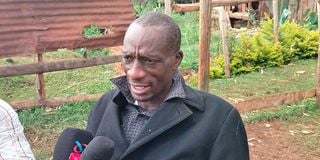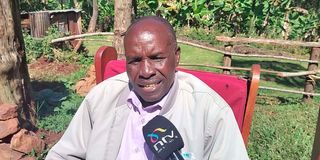Premium
Breast cancer in men: Two survivors' pain and advice on disease
What you need to know:
- Dr Bahati Riogi, an Oncoplastic breast cancer surgeon based at the KTRH Oncology Unit, confirms that breast cancer affects both females and males.
- "It is an abnormal growth of cells within the breast tissue that results in a tumor. It is one of the common cancers globally and in Kenya," she explained, however, women are more likely to get breast cancer compared to men.
In February 2023, Mr Bethwel Nyangweso of the Nyakongo area, Kisii County, felt a lump on his breast, which shortly became unbearably painful.
He sought treatment at a hospital in Nairobi where he was diagnosed with Stage III breast cancer.
"Even men can get breast cancer. I am a living example. Men should form a habit of going for breast cancer screening," said the father of three.
As part of treatment, a surgery was conducted followed by eight chemotherapy sessions at the same facility.
He later came back home to Kisii, but due to the lack of a facility offering radiotherapy in the entire Nyanza region, Mr Nyangweso returned to Nairobi for the service.

Mr Bethwel Nyangweso, a breast cancer survivor, at his home in Nyakongo area of Kisii Township.
He underwent 15 sessions of radiotherapy.
Nation met him while tending to his cattle and poultry at home. He is currently undergoing hormonal therapy.
The therapy involves swallowing a tablet every day for five years, he explained.
Cancer treatment is very costly, he said, noting that the National Hospital Insurance Fund (NHIF) only covers a small bit of the needed funds.
Plus, he noted that a drug called tamoxifen is not available in local public health facilities in the Nyanza region, yet it is very crucial in their daily treatment.
In the neighbouring Nyamira County, we meet Mr Chrisantus Bundi, 72, inspecting his cows, and vegetable and banana farms at home.
The former civil servant says he has been practicing small-scale farming for a living.

Mr Chrisantus Bundi, a breast cancer survivor at his home in Nyamira County.
Together with the support of his children, he started constructing a permanent house, but it stalled when he became sick, and all the monies were diverted to his treatment.
In 2022, he was also diagnosed with breast cancer.
When his wife, Jane Bundi, first noticed a lump on his breast when he was coming from the bathroom, Mr Bundi downplayed it.
"It is not anything painful. It will go away on its own," Mrs Bundi recalled of the husband's statement.
Days later, the husband came back to report that the swelling was producing some fluid but remained painless.
The only pain that he reported was in his leg.
"He went to the hospital, but only sought treatment for the pain in his leg, not the swelling on his breast," said Mrs Bundi.

Mrs Jane Bundi, wife of breast cancer survivor Chrisantus Bundi, at their home in Nyamira County.
Time passed and the swelling was discharging blood that was now soaking his clothes.
Mr Bundi went to the Kisii Teaching and Referral Hospital (KTRH), a biopsy was conducted, and it was established that he had cancer.
To date, he has undergone surgery, chemotherapy, and radiotherapy and is currently on hormonal therapy.
"I am here to inform you that breast cancer can affect anybody, man or woman, and at any age. Some people perceive that it is an ailment for women which is not true," said Mr Bundi.
He is out to remind men not to ignore anything suspicious on their breasts.
"Most cancerous tumors are either painful or painless. Mine was painless until such a time when I learnt it was not going away," he said.
He urged members of the community to stop being ignorant by associating cancer patients with witchcraft.
This causes a lot of stigma hence an impediment in the treatment process.
Mr Bundi called on county governments to construct facilities that can handle cancer cases next to the people at the grassroots, this will ease the burden that patients undergo while seeking help.
In his case, he travels to Moi Teaching and Referral Hospital in Eldoret to have his radiotherapy.
He noted that Kisii County recently established an Oncology Unit, giving hope to patients.
Even so, the facility cannot still provide radiotherapy services.
Dr Bahati Riogi, an Oncoplastic breast cancer surgeon based at the KTRH Oncology Unit, confirms that breast cancer affects both females and males.
"It is an abnormal growth of cells within the breast tissue that results in a tumor. It is one of the common cancers globally and in Kenya," she explained, however, women are more likely to get breast cancer compared to men.
"One in eight women will eventually develop cancer in their lifetime whereas only one in 922 males will develop breast cancer. That is to say that males also get breast cancer. Both genders have breast tissues," she said.
Dr Bahati noted that she gets to see 30 patients at her breast cancer clinic every week. Of the number, about 10-20 per cent are found to have breast cancer.
Men, Dr Bahati observed, often seek screening and treatment for breast cancer when it is already late.
"As a specialist, the majority of patients I see come at advanced stages. They give excuses of financial constraints or that it was attended to at a dispensary and given medicine," she said.
Dr Bahati noted the possibility of some lower-tier health facilities at times failing to give patients the correct advice at the first time of presentation.
"Such lead to delays in diagnosis hence not so very good outcomes that as a specialist may want to see," she noted
"My lowest moment is seeing a patient presenting with a suspicious mass and the patient has no means to have the test done. Some resort to herbal medication and later come when it is too late".
The specialist urged the community and relatives against neglecting cancer patients for it is a disease like any other.
She observed that some people neglect patients on the false belief that they are soon dying.
Treatment for breast cancer is the same in both men and women since it deals with breast tissues, she explained.
The exact cause of cancer is not known but it is thought to be a combination of risk factors.
For instance, most men who are diagnosed with breast cancer are aged 60 years and above.
However, Dr Bahati observes that there are instances where younger men have been diagnosed with the same.
Genetics may also determine the possibility of someone suffering from breast cancer, and any other form of cancer.
The foregoing are non-modifiable risk factors, but the modifiable risk factors include obesity, smoking, and alcoholism, explained the specialist.
"Breast cancer is curable. Let patients not mix hospital medication with herbal medicine," urged Dr Bahati.
People should keep on touching their breasts to note any changes as soon as they begin to develop, she advised.
A change of colour of the skin on the breasts, discharge, or wound with purse or blood are other signs of a possible breast cancer infection.
Dr Bahaty has received praise from her patients as well as Kisii County Government leadership for her exemplary role in the fight against cancer.
Kisii Governor Simba Arati, while officially opening the Oncology Centre last month, commended Dr Bahaty for her efforts, saying she has over time shown commitment in the fight against cancer.





